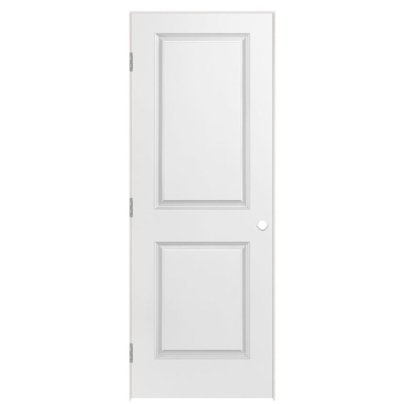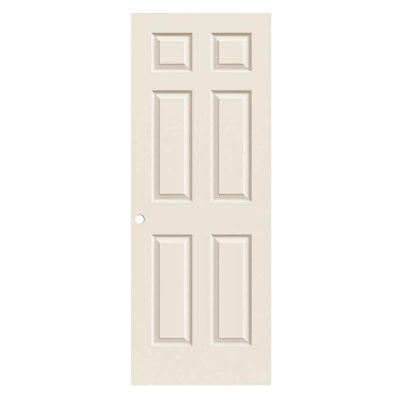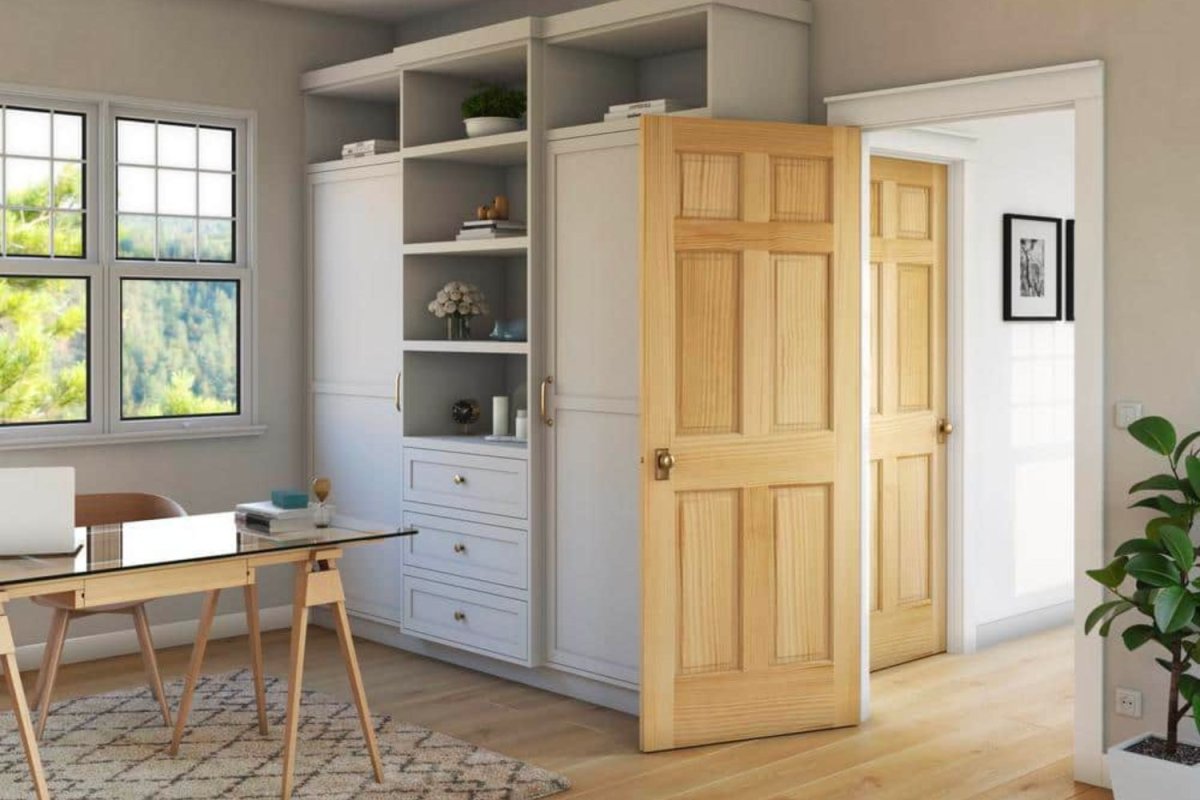
We may earn revenue from the products available on this page and participate in affiliate programs. Learn More ›
Whether it’s a new home build, a whole-house renovation, or simply matching a new door to the old door, choosing the best interior door is important. After all, these doors open and close multiple times a day for years and years, so they need to be durable and complement a home’s style.
But how does one find one of the best interior doors? This guide can help. It explains all of the need-to-know information about choosing these doors and highlights some of our favorite choices.
- BEST OVERALL: Masonite 2-Panel Square Interior Molded Door
- BEST BANG FOR THE BUCK: Jeld-Wen Colonist Textured All Panel Molded Door
- BEST WOOD: EightDoors 6-Panel Solid Unfinished Pine Wood Door
- BEST PREHUNG: Masonite 6-Panel Solid Core Interior Molded Door
- BEST SLAB: Jeld-Wen Continental Smooth All Panel Molded Door
- BEST HOLLOW-CORE: Masonite Riverside Interior Molded Door
- BEST SOLID-CORE: Kimberly Bay Shaker 5-Panel Solid Core Interior Door
- BEST FLUSH: Steves & Sons Unfinished Flush Interior Door Slab
- BEST PANEL: Kimberly Bay White Shaker 2-Panel Solid Core Door
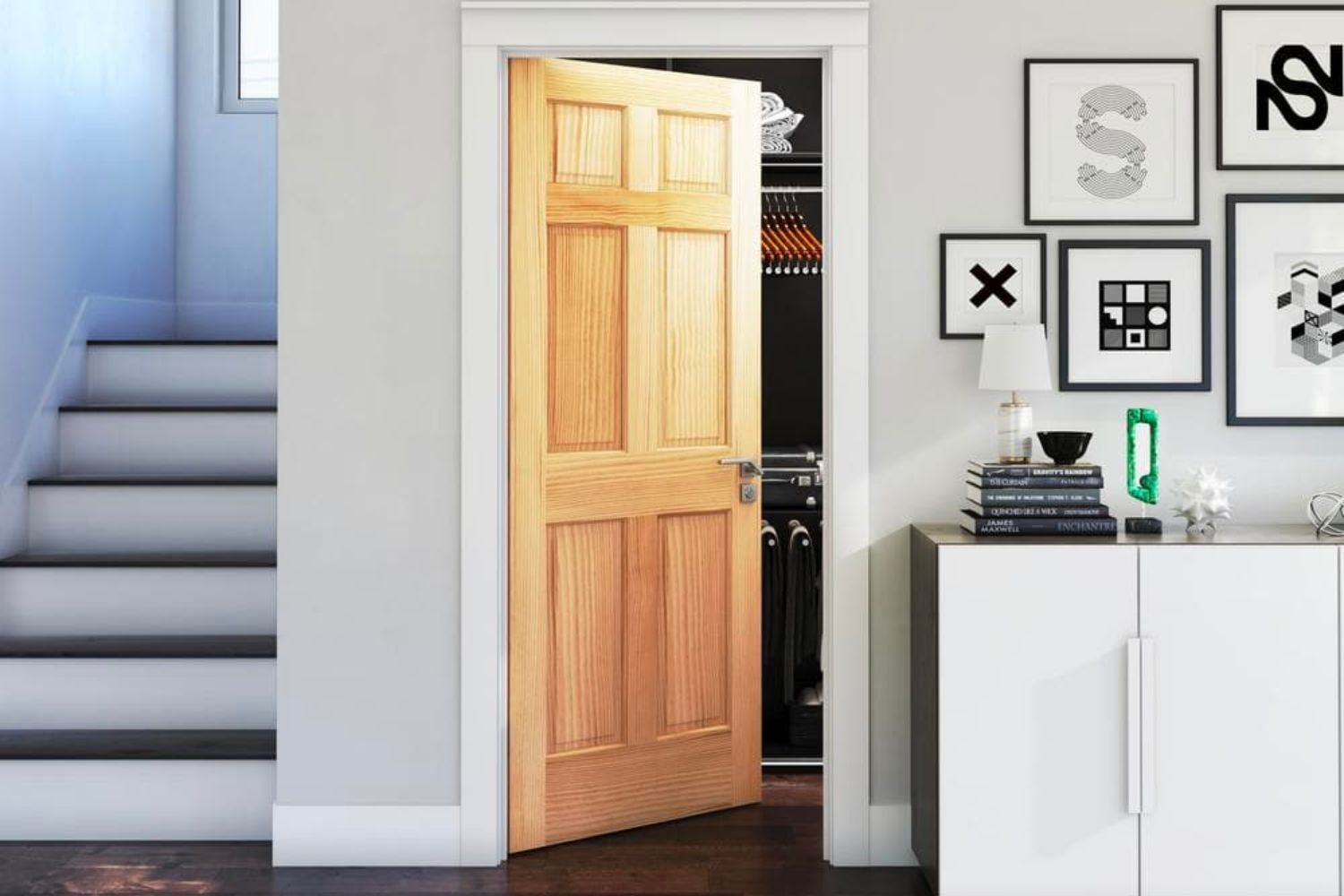
How We Chose the Best Interior Doors
Choosing the best interior doors wasn’t an open-and-shut case. Not only did we draw upon our experience installing interior doors on jobsites, but we also considered our everyday experiences in our own homes to develop a list of important features one might need from an interior door.
First, we performed extensive product research to compile a list of some of the top products. Then we compared prices, available sizes, and other factors to ensure that each product would provide enough value. Doors that didn’t make the cut were cast aside while those that did were given awards based on their strengths.
Our Top Picks
There is something on this list for just about any scenario, so be sure to compare each model carefully before making a final decision.
Best Overall
Masonite 2-Panel Square Interior Molded Door
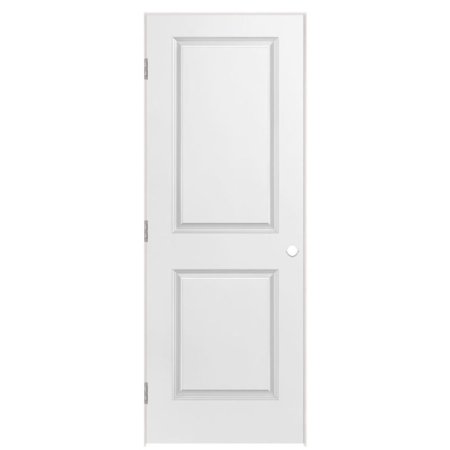
Pros
Cons
Product Specs
- Type: Prehung
- Style: Panel
- Core: Hollow
- Material: Molded composite
Homeowners looking for a door that can deliver in several ways should check out Masonite’s 2-Panel Square Interior Molded Door. This door features a timeless design that will fit in with most homes’ styles, and it’s available in common 24-, 28-, 30-, 32-, and 36-inch-wide sizes. It comes primed and ready for paint, as well.
This is a prehung door, meaning it’s set in a frame with hinges and is predrilled for a doorknob. This makes installation simple and requires fewer tools. And, since it is a hollow-core door, it’s much more affordable than a solid-wood or solid-core door. The downside is that it won’t do a great job of trapping sounds within a room.
Get the Masonite two-panel interior door at The Home Depot.
Best Bang for the Buck
Jeld-Wen Colonist Textured All Panel Molded Door
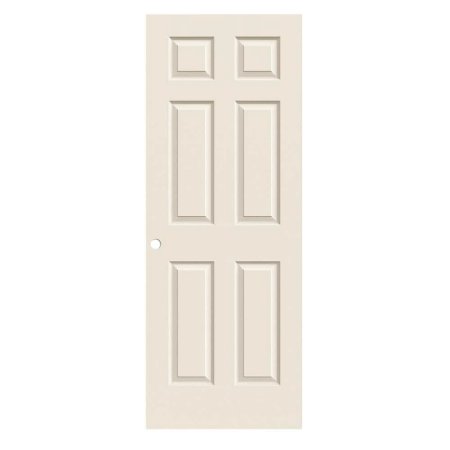
Pros
Cons
Product Specs
- Type: Slab
- Style: Panel
- Core: Hollow
- Material: Molded composite
Tradition doesn’t need to break the bank, and the Jeld-Wen Colonist door proves it. Between the classic and timeless style and the low price point, this door will fit any budget and nearly any home’s style. It’s a hollow-core option with primed composite molded panels. It also comes in a wide range of sizes including 18, 24, 28, 30, 32, and 36 inches wide and both 78- and 80-inch heights.
This slab door comes as a blank slate, free of hinges, allowing DIYers to install it in any door jamb they’d like. It’s available with or without a knob hole, so users should think long and hard about which way to order it. A knob that doesn’t line up will require jamb modification. However, with this six-panel design, a knob that doesn’t fall dead center of the rail can also be off-putting.
Get the Jeld-Wen Colonist interior door at The Home Depot.
Best Wood
EightDoors 6-Panel Solid Unfinished Pine Wood Door
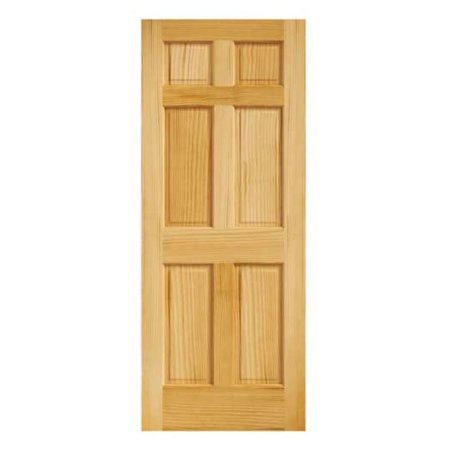
Pros
Cons
Product Specs
- Type: Slab
- Style: Panel
- Core: Solid
- Material: Clear pine
Solid wood doors are often out of the budget for most folks, but EightDoors offers an option worth considering. This solid-wood door features a traditional six-panel design with real clear pine rails and stiles, offering the weight and soundproofing that a hollow-core door cannot. It comes in common sizes, including 24, 28, 30, and 32 inches, all of which are 80 inches tall. However, as a solid-wood door, there’s more material to trim, if necessary, making it a great option for unique door frames.
This door comes as an unfinished clear pine slab. DIYers can choose to prime and paint the door or stain and seal it. Also, since it doesn’t have hinges or a knob hole, it’s ready for modification and can fit most door frames with a bit of work. Just keep in mind that as a real wood product, this door can expand and contract with the weather, and that can cause seasonal sticking or slamming.
Get the EightDoors interior door at The Home Depotor Lowe’s.
Best Prehung
Masonite 6-Panel Solid Core Interior Molded Door
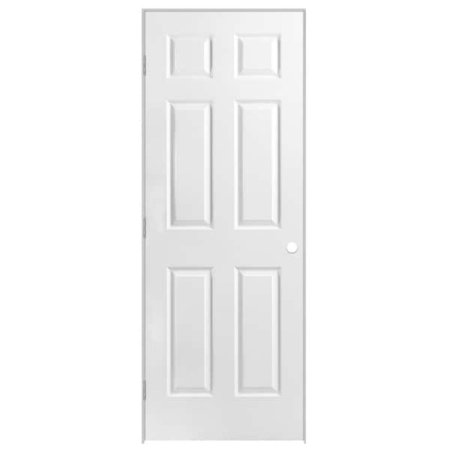
Pros
Cons
Product Specs
- Type: Prehung
- Style: Panel
- Core: Solid
- Material: Molded composite
Those looking for tradition, substance, and convenience might consider the Masonite six-panel door. This door features a classic design and comes prehung on a frame, allowing users to give new builds or renovations a timeless design quickly and easily. It’s available in several sizes including 24, 28, 30, 32, and 36 inches wide.
This door features molded composite sheets with a solid core between them, giving the door the substance and soundproofing some folks might be looking for. It comes primed and ready for paint, allowing users to go from rough opening to finished in fewer steps. However, this all does come at a price—it’s a bit more expensive than a hollow-core model.
Get the Masonite six-panel interior door at The Home Depot.
Best Slab
Jeld-Wen Continental Smooth All Panel Molded Door
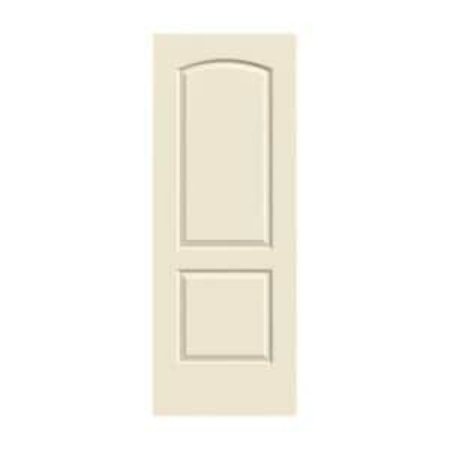
Pros
Cons
Product Specs
- Type: Slab
- Style: Panel
- Core: Hollow
- Material: MDF
Those who want to replace all of their interior doors without breaking the bank or going with the same old, same old should check out this option from Jeld-Wen. The Continental is a two-panel design with an arched upper panel, giving this door a more dramatic look than a basic slab door. It’s available in 18-, 24-, 28-, 30-, 32-, and 36-inch-wide sizes, all of which are hollow core.
As a slab door, the Continental comes free of hinges or knob holes, allowing DIYers to install it in any size-matched door frame. It features a hollow-core design with an MDF (medium-density fiberboard) exterior, allowing for affordability but possibly sacrificing scratch resistance over a molded composite, which may be a factor for homes with pets or children. However, it does come primed and ready for paint.
Get the Jeld-Wen Continental interior door at The Home Depot.
Best Hollow-Core
Masonite Riverside Interior Molded Door

Pros
Cons
Product Specs
- Type: Prehung
- Style: Panel
- Core: Hollow
- Material: Composite
Masonite makes it possible to go with a lightweight hollow-core door that’s not only easy to install but also stands out from the crowd. This door features a Shaker-inspired design with five horizontal panels from top to bottom, giving these doors a look that’s not as common as it once was. They’re available in sizes ranging from 24 to 36 inches.
Admittedly, the price is slightly high for a prehung hollow-core door, but there are some points that may make it worth the cost. First, the composite wood shell is durable, and it comes primed and ready for paint. Also, the five-panel design is somewhat unique and can be a great choice when authentic real wood doors are out of reach. This is especially true for older homes in the Northeast where the Shaker style often permeates the architectural design.
Get the Masonite Riverside interior door at The Home Depot.
Best Solid-Core
Kimberly Bay Shaker 5-Panel Solid Core Interior Door
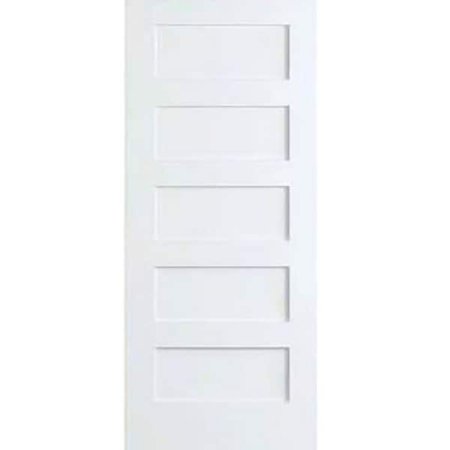
Pros
Cons
Product Specs
- Type: Slab
- Style: Panel
- Core: Solid
- Material: Pine core and MDF face
For a unique approach to solid-core doors, check out Kimberly Bay’s Shaker-style door. It features a solid pine core with an MDF face, allowing it to take the look of a traditional five-panel Shaker door while remaining durable. It’s available in 24-, 28-, 30-, 32- and 36-inch-wide sizes.
This door comes as a blank slab that will work as hinged doors or even sliding barn doors thanks to the solid pine core’s strength. Also, due to its design, DIYers can trim the top, bottom, and sides relatively freely. It also comes primed and ready for paint, helping installers skip a time-consuming step. Though it must be noted that shoppers pay more for this on-trend style and solid core.
Get the Kimberly Bay five-panel interior door at The Home Depot.
Best Flush
Steves & Sons Unfinished Flush Interior Door Slab
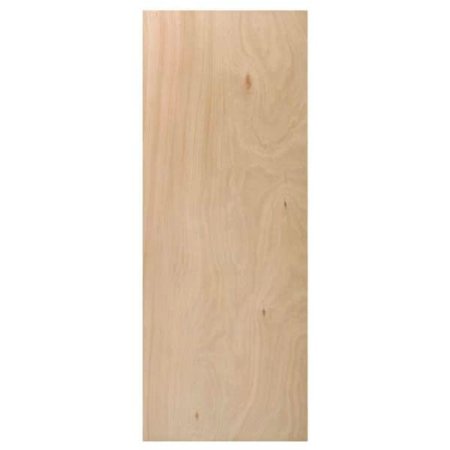
Pros
Cons
Product Specs
- Type: Slab
- Style: Flush
- Core: Solid
- Material: Particleboard core and veneer face
Those looking for the most from a flush door should check out Steves & Sons Unfinished Flush Interior Door Slab. This door slab features a sturdy wood surface (made from thin plywood) that’s entirely flat and clean, lending itself well to contemporary designs. It comes free from hinges or a knob hole.
Although Steves & Sons manufactures these doors in a variety of sizes, they are most readily available in the 36-inch by 80-inch size. Despite this limitation, they do feature a solid core that reduces sound transference, gives the door a more solid feel, and provides a bit more insulation. They also come unfinished and unprimed, giving DIYers a world of possibilities with stains and paints.
Get the Steves & Sons interior door at The Home Depot.
Best Panel
Kimberly Bay White Shaker 2-Panel Solid Core Door
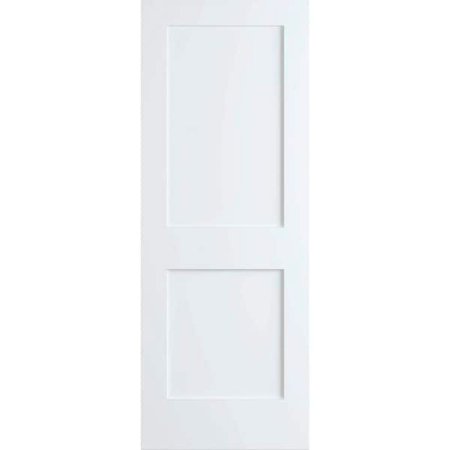
Pros
Cons
Product Specs
- Type: Slab
- Style: Panel
- Core: Solid pine
- Material: MDF and pine
Folks looking for a clean, classic panel look that is truly as sturdy as it looks should give some consideration to Kimberly Bay’s two-panel door. This door features a solid pine core with an MDF face, giving it the sound resistance and substance it needs while also remaining affordable. It’s manufactured in 18-, 24-, 28-, 30-, 32-, and 36-inch widths, all of which are 80 inches tall. And, due to its pine and MDF construction, it can be trimmed easily—a benefit for a slab door.
These doors come as blank slabs, meaning no hinges or knob holes. They’re also preprimed, allowing DIYers to skip the process of priming before applying a coat of paint. However, it’s important to note that this is not an inexpensive door, especially for one that comes without a frame.
Get the Kimberly Bay two-panel interior door at The Home Depot or Wayfair.
Anyone looking to enclose a room without making it feel too tight or closed off might want to check out Reliabilt’s French door. This door is made from solid pine and features 15 glass lites from top to bottom, giving it a bright and welcoming feel—even when closed.
This door comes as a blank slab, so DIYers will have to adapt it to their existing frames. This also makes it a highly flexible solution for a variety of rooms, such as living rooms, studies, offices, and similar spaces. Do keep in mind that despite having an all-wood frame, it may be less forgiving when it comes to trimming and adapting to askew frames.
Product Specs
- Type: Slab
- Style: French
- Core: N/A, glass lites
- Material: Pine and glass
Pros
- Lots of glass to keep from feeling closed off
- Slab design ideal for existing frames
- Solid pine construction
Cons
- Not as forgiving for trimming as other solid wood doors
Get the Reliabilt interior door at Lowe’s.
Our Verdict
Folks looking for an all-around high-quality door should consider the Masonite two-panel interior door for its timeless design. However, those who want something a bit more affordable should give the budget-friendly Jeld-Wen Colonist interior door a look.
What to Consider When Choosing the Best Interior Doors
Even with a great list of doors to choose from, it can still be difficult to know how to choose the best one. The following are some of the most important considerations to keep in mind when deciding on the best interior doors for a home.
Material
Like most things home-improvement-oriented, interior doors come in a variety of materials. In general, doors are made from wood, MDF, molded composite materials, foam, plywood, or a combination of these materials. MDF is a composite material made from glue and sawdust, and it’s compacted under extreme pressure to create a durable, dense material.
The molded composite materials typically contain wood fibers, fiberglass, and other materials to create a durable, plasticlike sheet. Any plywood (layers of thin sheets of wood glued together) in a door is typically lauan, which is a tropical hardwood used to make very thin and lightweight layers. Any foam used is inside the door, giving it a bit more substance and sound resistance.
Some doors are made from solid wood throughout, meaning the rails (the horizontal pieces), stiles (the vertical pieces), and the panels that fit within them are all wood. Other doors feature a combination of wood composites cast in forms or molds to mimic the look of solid wood. They are typically made with thin sheets of plywood sandwiched over MDF for durability and cost-effectiveness. They may also be constructed from molded composites made from particleboard and glass fibers. Solid wood doors are typically the most expensive and the most durable, but those made from MDF, plywood, or other composites are very affordable.
Doors that aren’t solid, known as hollow-core doors, have empty space between the MDF, molded-composite material, or plywood. Solid-core doors may be filled with foam or wood fibers for a more substantial feeling as well as better soundproofing.
Style
There are so many door styles that it can be difficult to include them all. The following are some of the most common types of door styles:
- Six-panel: Six-panel doors are the most traditional style, and they feature two columns of three panels. The top panels on each side are considerably smaller than the others.
- Two-panel: Two-panel doors consist of two stiles and three rails with panels resting between them. The shapes and profiles of the panels and top rails come in a variety of styles as well.
- Shaker: Shaker doors are simple, consisting of rails and stiles and one, two, three, five, or seven inset panels.
- Flush: Flush doors are smooth and appear to be one big piece of wood. They’re clean and simple, making them ideal for minimalist or modern designs.
- Double doors: Double doors consist of two doors that meet within a door frame. They can be any style of door but are most popularly French style.
- French doors: French doors are a pair of doors with glass panels from top to bottom.
Flush vs. Panel
The two main types of door styles are panel and flush doors. These two doors couldn’t be more different except that they’re both available in hollow, solid wood, or solid-core varieties.
Flush doors are smooth, flat doors with very little to show but clean, crisp lines. They look like one solid piece of wood and are often made from plywood, making them extremely affordable. However, they’re also available in solid wood, which is a more expensive option. The meet in the middle is a solid-core door, which usually consists of foam and wood fiber between two plywood sheets, but they don’t offer the beauty and heft of solid flush doors.
Panel doors are the very opposite. Traditionally, these doors were made from solid wood with separate rails, stiles, and panels inset. This gives them a traditional, handcrafted look. Today, they’re available in solid wood, hollow core, and solid core, as well as a variety of styles. They’re typically affordable, but higher-end wood species can drive up the price.
Slab vs. Prehung
There are two ways to buy a new door: slab and prehung. Both have specific applications in which one is a better choice than the other.
Slab doors are literally just the door. There isn’t a frame, a hole for a doorknob, or hinges. Installers have to match these doors to the existing frame to make them work. But they’re great for renovations as DIYers can update the look of their interior doors without removing trim or creating a mess.
Prehung doors are best when there is a rough opening to install a door in, as is the case with new framing. These doors come with a frame attached and all the installer has to do is attach the door to the wall framing to install it.
Additional Features
There are a couple of other smaller points, but they’re still important to understand. Many doors come with some type of finish. This is often a primer, giving the user the ability to paint the door as soon as they’d like without worrying about priming. Other doors may include clear coats of varnish or polyurethane, which are stunning, but installers must take care not to scratch the finish.
Also, consider swing when ordering a prehung door. Left-hand swing and right-hand swing determine which way the door will swing, and it can be confusing, as the door can swing left from one side but seemingly swing right from the other side. Here’s a tip:
- Open the door all the way and stand in the doorway.
- Place your back against the hinge side of the door frame.
- Note whether the door is on the left or right. If it’s on the left, this is a left-hand swing. If it’s on the right, this is a right-hand swing.
FAQs
With all of that information on the best interior doors and how to choose them, some folks may have information overload. However, there could still be some questions that need answering. The following are some of the most frequently asked questions about interior doors.
Q. Is it easy to replace an interior door?
Replacing an interior door is relatively simple, whether it’s a slab or prehung model. However, there are some specific tools necessary for the job. When it comes to prehung doors, pry bars, a set of good quality bubble levels, some shims, and a hammer are generally all it takes. But the tools to replace a slab door include a router, hinge jig, combination square, doorknob jig, and chisels.
Q. How much does a good interior door cost?
A good interior door is typically solid core, which can run a DIYer anywhere between $100 for a slab door to $300 or more for a prehung model.
Q. What is the most popular interior door?
The most popular interior door is a panel door. These doors have been around for centuries and are still popular to this day.
